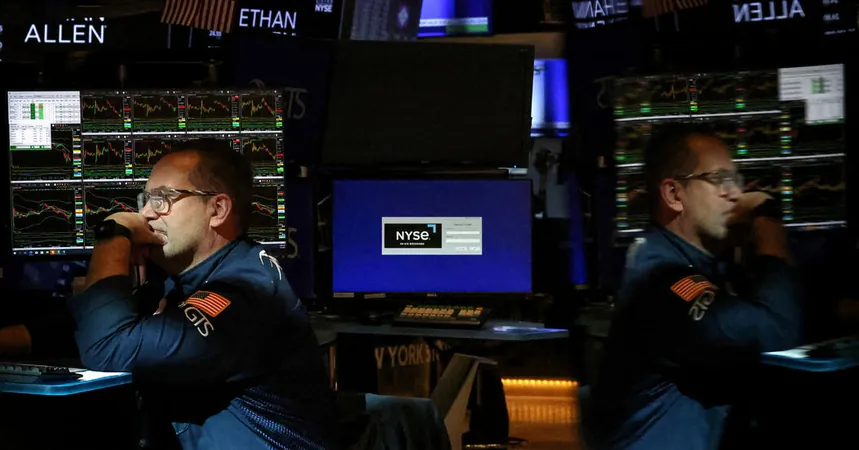
Trade Turmoil: Trump Tariffs Send Shockwaves Through Global Markets
2025-04-09
Author: Wai
Markets on Edge: Turbulence Amid Tariff Tensions
In a dramatic turn of events, European Union member states voted to impose retaliatory tariffs against the U.S., aimed at countering Trump's recent levies. Set to take effect next Tuesday, these tariffs—reaching as high as 25%—will target a diverse range of American goods, from corn to plate glass. The EU has indicated that these countermeasures can be lifted if the U.S. agrees to equitable negotiations.
The market landscape is looking shaky, with the S&P 500 experiencing volatility as major indexes in Europe and Asia dropped. The dollar fell as government bond yields, often seen as safe havens during turmoil, surged.
Economic Alarm Bells Ringing
Traditionally, stocks and bonds don't tumble simultaneously, but this unusual downturn highlights growing worries over Trump's tariffs. Investors fear these policies could disrupt global supply chains, spur inflation, and potentially usher in an economic downturn.
In response, President Trump assured followers on Truth Social with a confident, "BE COOL! Everything will work out! The USA will be bigger and better than ever!" Yet, the market isn't responding to his reassurances.
Global Stock Markets Feel the Pain
Asian markets faced another setback on Wednesday, and European stocks weren’t far behind. France’s CAC 40 index suffered a steep decline, erasing its gains for the year and pushing the S&P 500 close to bear market territory—a worrying sign for investors.
Bond Market Under Strain
A peculiar market trend is emerging where bond yields are climbing even as stocks and the dollar fall. This spike in yields, which push borrowing costs higher across the board, occurs as investors unload bonds to cover losses elsewhere. The 10-year U.S. Treasury yield jumped to around 4.4%—a significant rise from earlier in the week.
Political Responses Divide Opinions
In Washington, Trump’s trade representative reinforced the administration's stance, labeling the trade deficit a national emergency that justifies the tariffs. Amid mixed political sentiments, Michigan Governor Gretchen Whitmer described Trump’s approach to tariffs as unstable, warning of its detrimental effects on economic stability.
Oil Prices Plummet
In another distressing economic signal, U.S. oil prices dipped to approximately $56 a barrel—marking the lowest rates in over four years, raising alarms about dwindling economic confidence.
Asian Industries React
Businesses across Asia are grappling with the tariffs' fallout, with some finding that Trump's tariffs have paradoxically positioned China as a more attractive production hub. American tariffs have complicated operations for many companies in the region, creating uncertainty about where to manufacture goods.
Pharmaceutical Sector in Crisis
The drug market suffered as shares plummeted following Trump's tariff announcements targeting pharmaceutical imports—an action that particularly endangered India's drug exports, which have thrived in past years.
The Global Fallout: A Call for Unity
As politicians reconcile the tariffs’ backlash, many call for bipartisan collaboration to offset damage and revitalize manufacturing jobs. Whitmer and others highlight the importance of unity amid escalating partisanship.
Conclusion: Economic Uncertainty Ahead
As tensions rise between the U.S. and its trading partners, fear looms over a possible recession. Global markets remain highly sensitive, emphasizing the crucial need for policy clarity and stability as businesses navigate an increasingly turbulent landscape.



 Brasil (PT)
Brasil (PT)
 Canada (EN)
Canada (EN)
 Chile (ES)
Chile (ES)
 Česko (CS)
Česko (CS)
 대한민국 (KO)
대한민국 (KO)
 España (ES)
España (ES)
 France (FR)
France (FR)
 Hong Kong (EN)
Hong Kong (EN)
 Italia (IT)
Italia (IT)
 日本 (JA)
日本 (JA)
 Magyarország (HU)
Magyarország (HU)
 Norge (NO)
Norge (NO)
 Polska (PL)
Polska (PL)
 Schweiz (DE)
Schweiz (DE)
 Singapore (EN)
Singapore (EN)
 Sverige (SV)
Sverige (SV)
 Suomi (FI)
Suomi (FI)
 Türkiye (TR)
Türkiye (TR)
 الإمارات العربية المتحدة (AR)
الإمارات العربية المتحدة (AR)